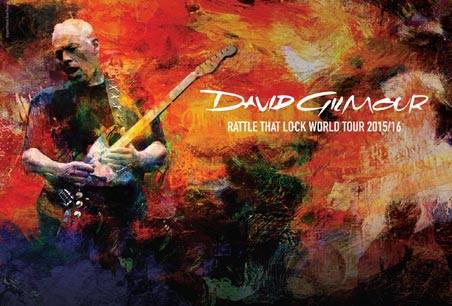David Gilmour at The Forum

David Gilmour
The Forum
Inglewood, CA
March 27
Just over halfway through his Easter Sunday performance, David Gilmour polled the sold-out house of his devoted as to whether or not they were having a reasonable time so far. Talk about trick questions. His three-hour, two-set epitome of arena rock awe, loaded with a timeline of Pink Floyd classics, put the self-effacing description of reasonable into a category of understatement nearing criminal.
Gilmour wasn’t being coy. There is a conspicuous sense that while he remains among the elite of rock guitar players, he is still there to entertain as much as he’s there to express. After a shadowed “5 A.M.” and two more- the title track and “Faces of Stone”-from his latest, Rattle That Lock, uncapped the evening, Gilmour’s co-producer and ace sideman Phil Manzanera strummed the familiar first chords of Floyd’s “Wish You Were Here.” A moving, unrushed reading of a song Gilmour has likely played countless times, he asked with a wink at its conclusion, “Is that what you wanted?”
To say his audience had come for a quota of Pink Floyd is probably obvious, given the number of 35-and-overs brandishing the band’s gear or applauding song snippets laced into a pre-show sound collage of chirping birds and jet planes. Yet, it’s Gilmour and his guitar that is more precisely the pervasive draw. On an arresting “The Blue” his tone is unmistakably thick and enveloping, soaring into the stratus, then, with extended riffing on “Money,” tenacious and lamenting. He’s a role player in the mounting and crashing ethereal space of “Us and Them,” letting desolate saxophone and piano have their time. Or he’s an enthusiastic pedal steel practitioner on a set-closing “High Hopes,” and comping jazzman for an after-hours “The Girl in the Yellow Dress.”
Among the bigger ovations came one following his Telecaster rave-up on the outro of “Fat Old Sun,” a 1970 nugget dusted off from Floyd’s Atom Heart Mother. It wasn’t the furthest Gilmour reached back to the past; that honor went to “Astronomy Domine,” its collapsing psychedelic dissonance from Pink Floyd’s 1967 debut, an album recorded before Gilmour was a member of the band. Visually, the show was indeed a show, with an enormous circular projector of video and light centered like an oracle over the ensemble. Complementary and proportionate to the scale of Gilmour’s repertoire, it wasn’t until the triple-encore of “Time,” “Breathe (Reprise),” and the final “Comfortably Numb,” that a grid of laser light arrived to bedazzle the Forum faithful and leave Gilmour spotlighted for a brilliant last and lasting solo.
He is graying and stubbly, outfitted in a plain T-shirt and jeans. He’s politely, quintessentially English in his remarks and mannerisms. He may be a reluctant guitar god, but only in appearance. David Gilmour’s voice and guitar remain, as they have always been, the lightning bolts of Zeus.



















